German Federal President Frank-Walter Steinmeier visits GEOMAR
The head of state learnt about outstanding research and school programmes
“With our research and our commitment to the transfer of knowledge and technology, we at GEOMAR contribute to preserving the function of the ocean and safeguarding it for future generations. We are therefore delighted about the continued interest of the German Federal President Frank-Walter Steinmeier and his visit today. For us, scientific research goes hand in hand with support for schools and contributions to social discourses or political decision-making,” says Professor Dr Katja Matthes, Director of GEOMAR Helmholtz Centre for Ocean Research Kiel. “Furthermore, we are proud to present our new building, which was inaugurated in May and now unites all four research departments of GEOMAR, administration and central facilities at one location. With modern infrastructure and numerous places for scientific exchange, it promotes excellent research at GEOMAR.”
"Here in Kiel, you don't have to convince people how important marine research is," says German Federal President Frank-Walter Steinmeier. He came to see how the new building brings together the locations of GEOMAR and thus improves research conditions even further. His travels abroad have also shown him how important GEOMAR's collaborations in West Africa and Cabo Verde are. "I am pleased that research is being carried out here - and I am also pleased about how young scientists are being promoted here," Steinmeier continued. "Pupils from the neighbouring schools here in Kiel who are involved in smaller research projects and obviously do so with enthusiasm, curiosity and ambition. The discussions have shown me that many of those who have worked and done research here for a while can definitely imagine pursuing a degree programme in the natural sciences. And these are exactly the young people GEOMAR needs in the future."
In October 2023, during a state visit to Cabo Verde, Federal President Frank-Walter Steinmeier got to know the Ocean Science Centre Mindelo (OSCM), which GEOMAR has been operating together with the Cape Verdean Instituto do Mar (IMar) on the island of São Vicente since 2017. Today, accompanied by Daniel Günther, Minister President of the State of Schleswig-Holstein, he took a tour of the recently inaugurated new GEOMAR building at the Seefischmarkt on Kiel’s eastern shore to find out about current research topics.
Research in Cabo Verde and the FUTURO project
During the visit, he also met the Kiel researchers again who continue to support the cooperation with West Africa from Cabo Verde and set international standards with the project “The Future of Tropical Upwelling Regions in the Atlantic Ocean” (FUTURO). FUTURO brings together a wide range of scientific disciplines in order to gain new insights into changes in this globally and regionally important marine area. It currently accounts for around a quarter of the global fish catch and thus ensures the food security of many people. The knowledge generated in FUTURO is intended to help decision-makers to develop a sustainable management for this important ecosystem.
GEOMAR has been cooperating closely with research and educational institutions in the Republic of Cabo Verde for almost 20 years. There is also a lively exchange with politics and society in the region. On the archipelago, we can see how the ocean influences our climate, feeds us and secures our livelihoods – and how it is already being influenced by climate change. The coastal upwelling area near Cape Verde is one of the most biologically productive and species-rich regions of the world ocean. It is of the highest ecological and socio-economic importance and is therefore also the focus of GEOMAR research.
The Baltic Sea as a time machine and potential for the restoration of seagrass meadows
A look at GEOMAR research in the Baltic Sea shows that regional topics play an important role in addition to the widespread international engagement. The Baltic serves as a “time machine” for science: Many changes that are still to come in other regions can already be observed here. For example, at the long-term observation station Boknis Eck in Eckernförde Bay, the temperature at a depth of one metre has already risen by two degrees Celsius since measurements began more than 65 years ago. And although nutrient inputs are slowly decreasing, phases of extreme oxygen depletion are becoming more frequent and longer.
In addition to the effects of climate change and other human influences, researchers in the Baltic Sea also investigate marine approaches for carbon dioxide storage. The restoration of seagrass meadows is one of several measures – combining many additional benefits. In addition to their importance for carbon dioxide storage, they protect coasts by slowing down waves and holding the sandy subsoil in place with their roots. They provide shelter and food for many marine animals and thus strengthen marine biodiversity. They can also filter pathogens out of the water.
There are currently only less than 300 square kilometres of seagrass meadows left in the German Baltic Sea. Around 60 per cent of the area still covered by seagrass at the beginning of the 19th century has already been lost. Worldwide, however, these ecosystems could store an additional 150 million tonnes of carbon dioxide per year. This amount is roughly equivalent to the greenhouse gases currently emitted by the transport sector in Germany.
To ensure that restoration has a long-term effect, researchers are trying to breed plants with genes that can withstand higher temperatures. The populations currently widespread in the Baltic Sea die off if the water exceeds 25 degrees Celsius for long periods of time. A project at GEOMAR funded by the German Federal Environmental Foundation (Deutschen Bundesstiftung Umwelt, DBU) also investigates these relationships.
GEOMAR school programmes also benefit from its proximity to the Baltic Sea and its direct location at the Schwentine, just a few hundred metres from the mouth of this river into the Kiel Fjord. Pupils from the Friday Research Club, a programme for particularly interested young people, showed the Federal President their projects on plankton identification or measurements of nutrient inputs from agriculture, for example. In addition to this programme, GEOMAR has been cooperating with schools and young people since 2004 in the form of project days, summer schools and training courses for teachers on marine and climate-related topics.
Deep-sea protection and deep-sea mining
At the end of the visit, Federal President Frank-Walter Steinmeier was able to see for himself GEOMAR's important contributions to the discourse on deep-sea mining and the protection of the deep sea. In the course of the development of “green technologies”, there is an increasing demand for special metals and metalloids, which are also found at the bottom of the deep sea. For example, mangan, copper, nickel and cobalt are found in polymetallic nodules, the largest known deposit of which is in the Clarion-Clipperton Zone in the North-East Pacific. The Federal Republic of Germany has a licence area there for exploration. The use of a prototype collector vehicle has also already been trialled there under scientific supervision. GEOMAR researchers are also contributing their findings to negotiations and processes at the International Seabed Authority (ISA) and advising policymakers on deep-sea protection issues in order to better answer questions about safe, environmentally friendly and sustainable utilisation.
“The exchange with the Federal President on some particularly important research aspects and transfer topics of GEOMAR was very valuable,” summarises Professor Dr Katja Matthes. “This attention motivates us to continue our mission and to further intensify the dialogue with politics and society beyond our numerous scientific collaborations.”
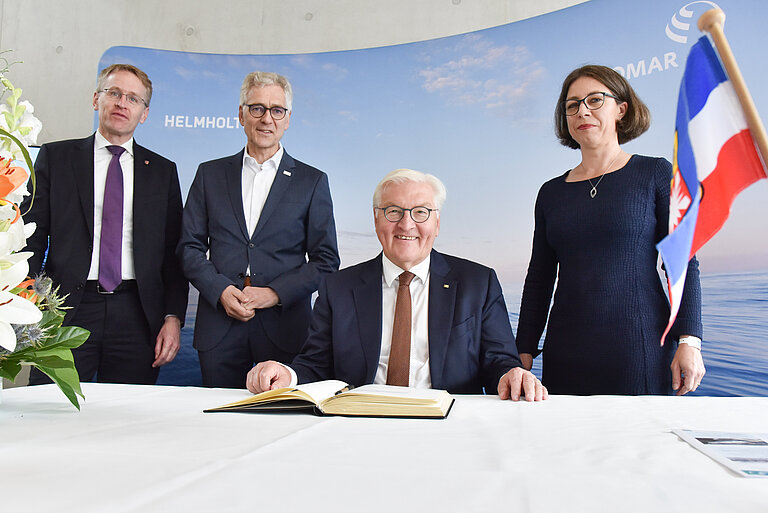
German Federal President Frank-Walter Steinmeier signs the guest book during his visit at GEOMAR. On his right side: GEOMAR Director Professor Dr. Katja Matthes, left: Daniel Günther, Minister President of Schleswig-Holstein, and Frank Spiekermann, Administrative Director of GEOMAR. Photo: Thomas Eisenkrätzer, GEOMAR
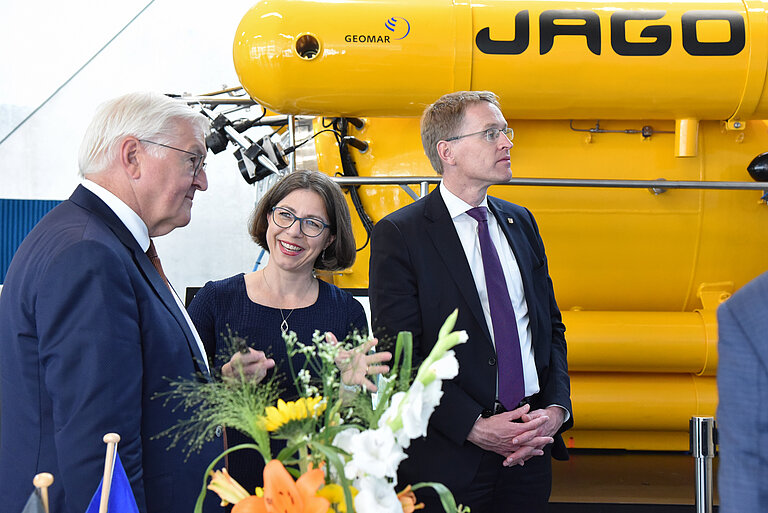
GEOMAR Director Professor Dr. Katja Matthes and German Federal President Frank-Walter Steinmeier. Photo: Thomas Eisenkrätzer, GEOMAR
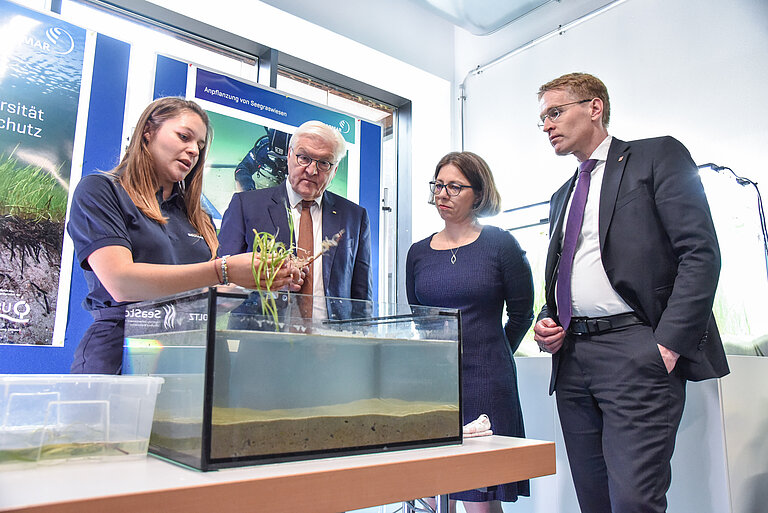
Jana Willim, PhD scholarship holder of the German Federal Environmental Foundation, demonstates how seagrass is planted at restoration sites. Photo: Thomas Eisenkrätzer, GEOMAR
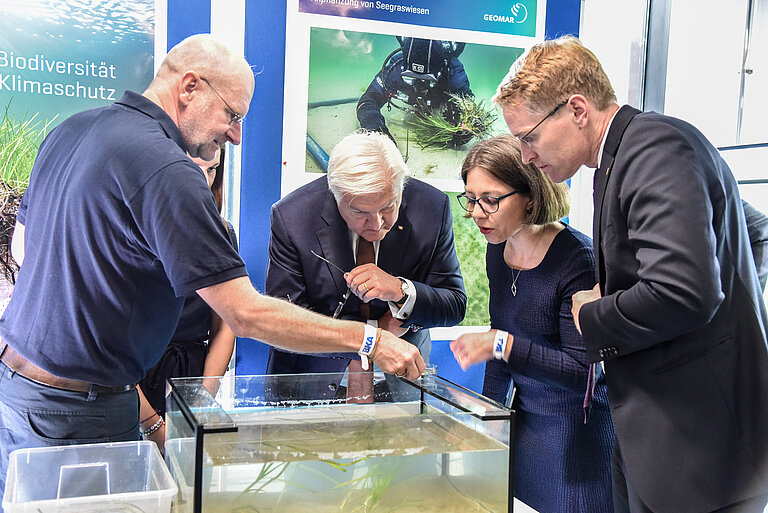
Prof. Dr. Thorsten Reusch, Head of the Research Department "Marine Ecology" shows seagrass seeds from the Baltic Sea. Photo: Thomas Eisenkrätzer, GEOMAR
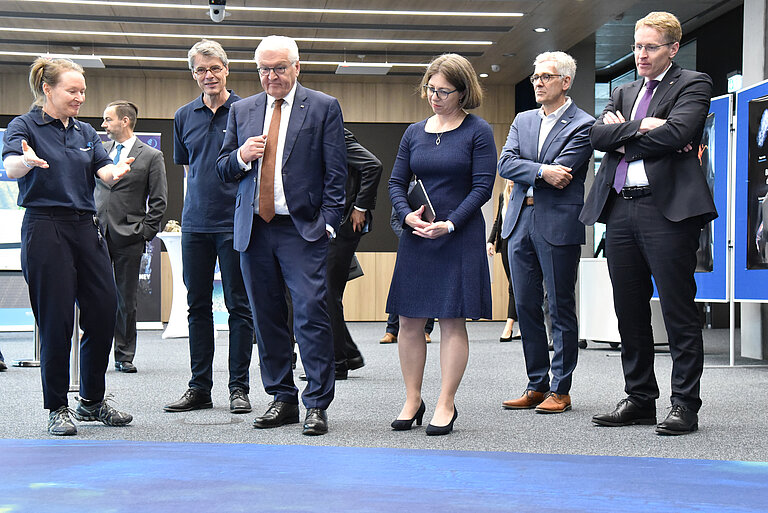
During his visit in Kiel, tthe Federal President also met again with Cordula Zenk, coordinator of the Cabo Verde cooperation, and Prof. Dr. Arne Körtzinger, scientific director of the Ocean Science Centre Mindelo and coordinator of the FUTURO project. Photo: Thomas Eisenkrätzer, GEOMAR
![[Translate to English:] Prof. Dr. Arne Körtzinger, explained the project FUTURO.](/fileadmin/_processed_/e/3/csm_eis_Steinmeier_Geomar__102__0bc819bb38.jpg)
Prof. Dr. Arne Körtzinger, explained the project FUTURO. Photo: Thomas Eisenkrätzer, GEOMAR
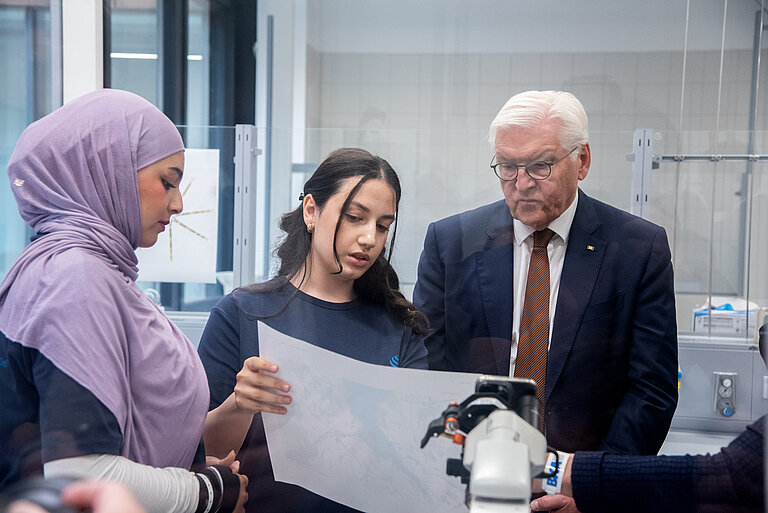
Rayan Ayedi and Anushik Yeghiazaryan, pupils of the Freitags-Forschungs-Club, impressed the Federal President with their work on plankton identification. Photo: Thomas Eisenkrätzer, GEOMAR

Lasse Hilscher and Robin Lundius presented their experiment on nutrient measurements in the Schwentine river. Photo: Thomas Eisenkrätzer, GEOMAR
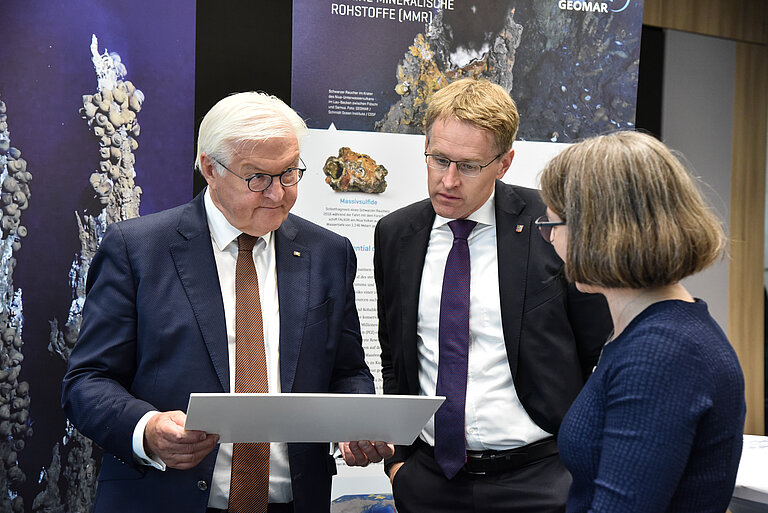
Federal President Frank-Walter Steinmeier also learnt more about the protection of the deep sea at GEOMAR. Photo: Thomas Eisenkrätzer, GEOMAR
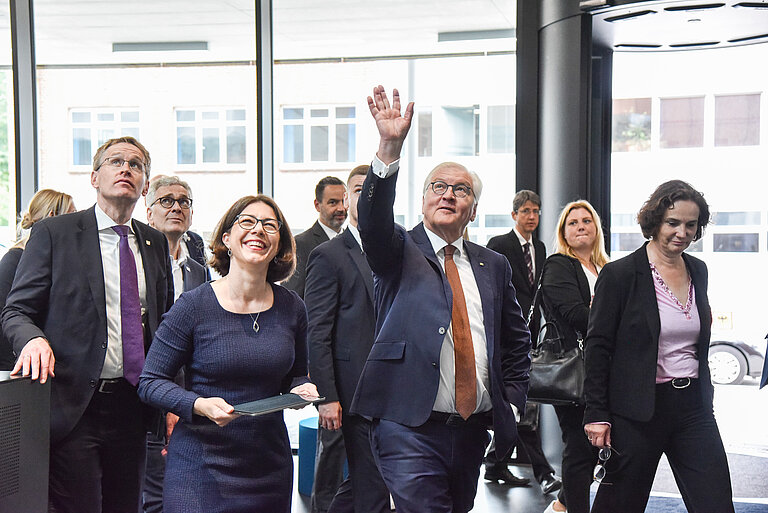
Federal President Frank-Walter Steinmeier also got to know the new GEOMAR building. Photo: Thomas Eisenkrätzer, GEOMAR
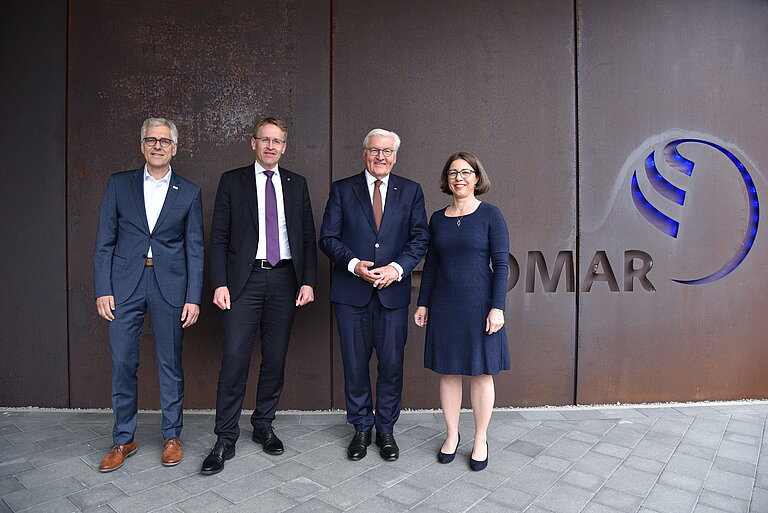
GEOMAR Director Professor Dr Katja Matthes with German Federal President Frank-Walter Steinmeier, Daniel Günther, Minister President of Schleswig-Holstein, and Frank Spiekermann, Administrative Director of GEOMAR (from right to left). Photo: Thomas Eisenkrätzer, GEOMAR


